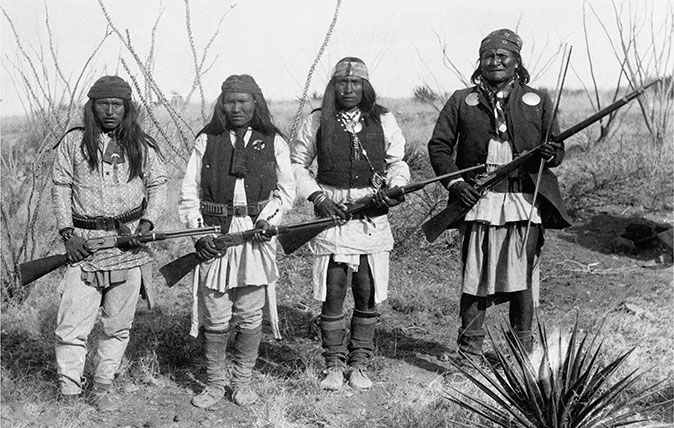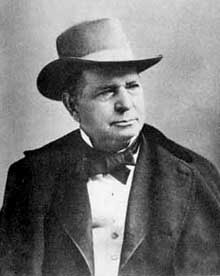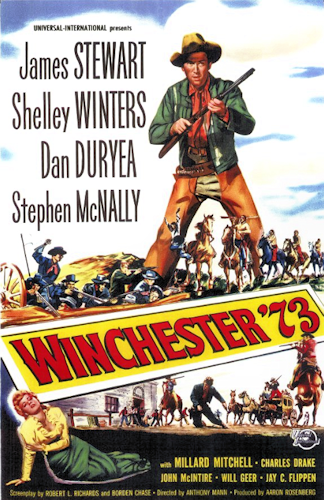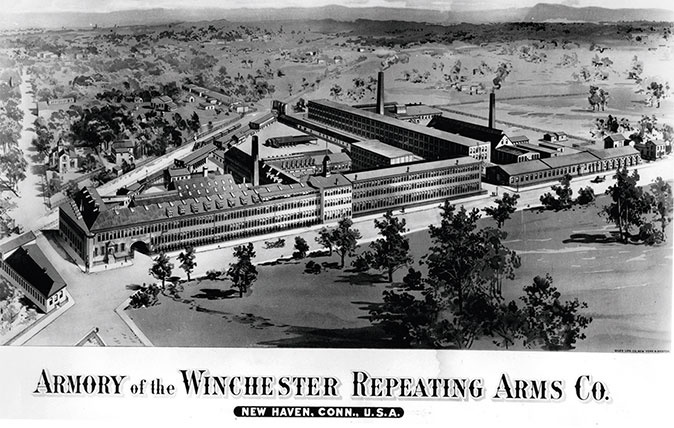The man who created the 'Gun That Won the West' – and how he never lost a wink of sleep
BBC reporter Laura Trevelyan tells the story of her great-great-great grandfather - the man who brought the world the 'Winchester Repeater'.


Exquisite houses, the beauty of Nature, and how to get the most from your life, straight to your inbox.
You are now subscribed
Your newsletter sign-up was successful
Oliver Fisher Winchester was born a penniless farm boy on the outskirts of Boston in the USA in 1810. With barely any formal education, this determined New Englander rose to found the Winchester Repeating Arms Company, maker of one of the first repeating rifles the world had ever seen.
The Winchester, which fired again and again without needing to be reloaded, was revolutionary. It helped transform modern warfare and became known as the ‘Gun That Won The West’ for its role in the brutal expansion of the American frontier.

Oliver was my great-great-great grandfather and, since moving to the USA in 2004, I’ve been seized with the desire to learn more about him. Relatives who’d worked for the Winchester factory frowned upon the idea of a company history — we don’t want dead Indians and buffalo on every page, opined one.
Oliver was born into a harsh, fend-for-yourself world, in which memories of the 1776 Revolutionary War against the British were still fresh. Guns had played a vital role in liberating Americans from colonial rule and, back then, a rifle was a way to get food and protect your family. Oliver’s father died soon after he was born, so he had to work on a farm from the age of six to bring much-needed pennies home to his mother.
Apprenticed as a church builder in his teenage years, he moved swiftly into the world of clothes manufacturing and made a tidy sum by patenting a dress collar for a gentleman’s shirt. Moving to New Haven, Connecticut, he mass-produced his shirts and began to look for where he could invest his spare cash.
The Civil War between the northern and southern states over the issue of states’ rights and the abolition of slavery was looming and canny Oliver figured that guns would soon be in demand. Despite knowing nothing about rifles, Oliver piled his money into New Haven’s Volcanic Repeating Arms Company.
"Oliver doesn’t appear to have lost a wink of sleep over the slaughter of the Native Americans. He became extremely wealthy, building an ostentatious home."
Unfortunately for the shirt-maker, the ballistics for the company’s weapons were sub-optimal and neither the pistol nor the ammunition was anything to write home about. Volcanic went bankrupt, but the irrepressible Oliver formed a new company from the ashes.
Exquisite houses, the beauty of Nature, and how to get the most from your life, straight to your inbox.

This time, the promise of the repeating rifle was turned into reality by his talented superintendent Benjamin Tyler Henry, who created a gun that could fire and fire again without needing to be reloaded, which would transform the way men fought.
The American Civil War began at Fort Sumter in 1861 and Oliver was hopeful of selling his new-fangled Henry repeating rifle to the northern side — but he hadn’t reckoned with the obdurate army bureaucracy. The elderly chief of ordnance believed that a repeating rifle could never work properly and would waste huge amounts of expensive ammunition by firing repeatedly, which was checkmate for Oliver and his ambitious plans.
Although individual battalions on the Union side in the Civil War, such as the 7th Illinois Volunteer Infantry, did equip themselves with the Henry rifle, the mass US Army order never came to pass. However, word of the rifle’s effectiveness spread far and wide and it became known as ‘the damn Yankee rifle that fired all week’.
With the end of the Civil War, America returned to its pursuit of new lands out west. The Winchester Repeating Rifle, as it was now known, proved the ideal weapon for settlers and cowboys, as they galloped across the plains they were now claiming as their own. As it didn’t need to be reloaded, it was especially handy when fighting on horseback.
The Native Americans had no defence against the weapon they called the ‘spirit gun. They were massacred on their ancient lands, as the frontier moved ever further westwards towards California.
At the time, Red Cloud, warrior and statesman of the Lakota tribe, lamented of the white men: ‘They made us many promises, more than I can remember, but they never kept but one; they promised to take our land, and they took it."

Oliver doesn’t appear to have lost a wink of sleep over the slaughter of the Native Americans. He became extremely wealthy, building an ostentatious home in New Haven with flamboyant turrets and luxurious walnut and white-oak cabinets. Meanwhile, the Native Americans acquired Winchester Repeating Rifles of their own through fighting settlers, with leaders such as Geronimo posing proudly with their bounty, as shown in the picture at the top of this page.
The Winchester name soon spread far and wide and, soon, Oliver was happily selling his rifle to forces defending Maximilian, the French-backed Emperor of Mexico. When the rebels trying to overthrow Maximilian also wanted to buy Winchesters, Oliver obliged. The Sultan of Turkey purchased Winchester rifles to fight against Russia, as the Ottoman Empire fought for its very survival.

The name of Winchester was becoming known across the globe. Oliver and his wife, Jane, experienced much personal sadness — only one of their four children outlived them — yet they became prominent New England citizens, known for their philanthropy and their fascination with scientific progress.
When Oliver died in 1880, he was a multi-millionaire, living a life far removed from the impecunious world he had been born into 70 years earlier.
- - -
Laura Trevelyan’s book, ‘The Winchester: Legend of the West’, is published by I. B. Taurus (£20)
Country Life is unlike any other magazine: the only glossy weekly on the newsstand and the only magazine that has been guest-edited by His Majesty The King not once, but twice. It is a celebration of modern rural life and all its diverse joys and pleasures — that was first published in Queen Victoria's Diamond Jubilee year. Our eclectic mixture of witty and informative content — from the most up-to-date property news and commentary and a coveted glimpse inside some of the UK's best houses and gardens, to gardening, the arts and interior design, written by experts in their field — still cannot be found in print or online, anywhere else.
